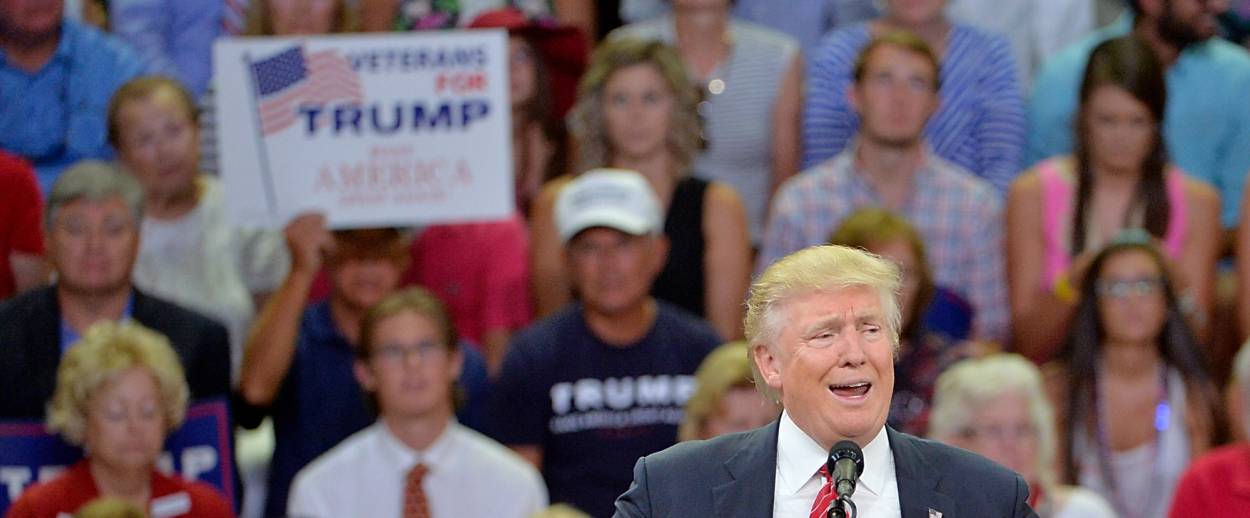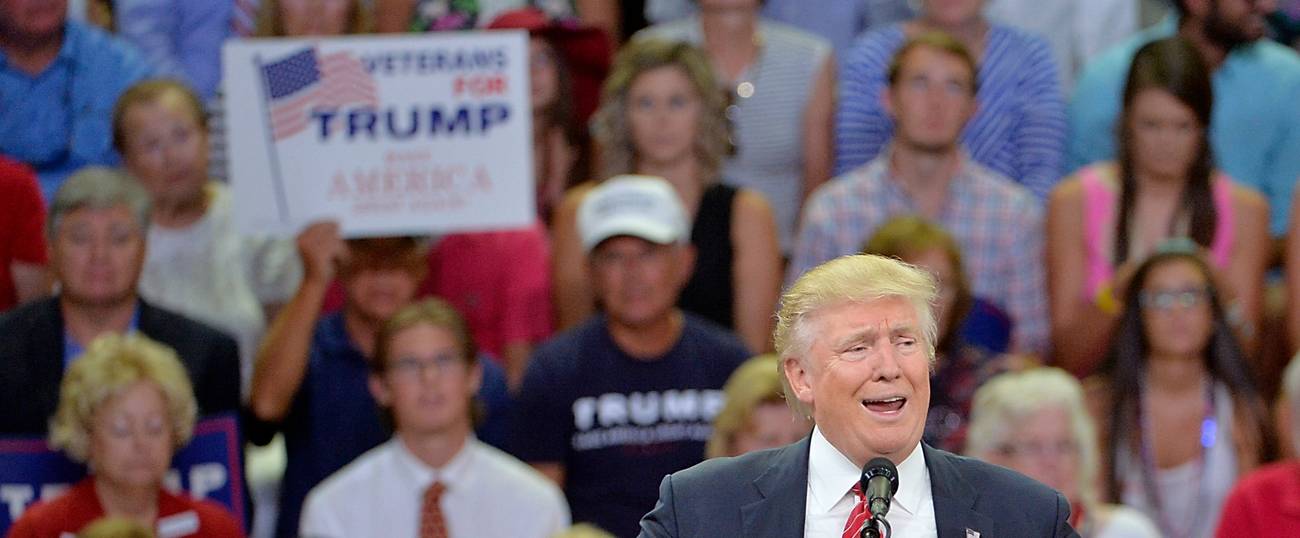Sometimes Your Words Just Hypnotize Me
Donald Trump’s ability to dominate his supporters into a frenzy is reminiscent of a magician from a Thomas Mann story who reduces his audiences into a mindless mob




In 1929, Thomas Mann published a story called “Mario the Magician.” It is a scary, creepy, ugly story about a magician/hypnotist who performs at a resort in Italy, humiliating, bullying, ridiculing, his audience, an audience that soon becomes helpless as he attacks and demolishes anyone who does not bend to his will. This story was written at a time when something horrible, something beyond imagination was slouching toward civilized Europe. Mann was writing about Italian fascism, about Mussolini, whose thugs in their clownish black uniforms were disrupting and brutalizing the populace.
While on vacation at the Italian beach resort of Torre, the narrator and his wife and young children attend a performance of the magician Cipolla. This performer is a man with a deformed body and a vicious compelling air who exerts demonic control over the audience. The tragedy that follows arises from the cruelty and pornographic abuses we see as Cipolla manipulates his helpless audience. The story describes and predicts the full political catastrophe that fascism would soon bring to the world.
The theater where this strange performance takes place is in southern Italy but the hall itself could be any place in America where Donald Trump is today holding a rally.
The people of the town of Torre are prudish and nasty to the narrator’s family when the eight-year-old daughter gets sand in her bathing suit and washes herself off in the ocean naked. This small anecdote announces the theme of sexual discomfort, rage, and repression which will appear in the theater, conjured by the hypnotist, fueled by the unnatural fear of sex and lack of humanity in the audience itself. Cipolla has convinced Mario the young man that he himself is Silvestra the woman he loves.
“Kiss me!” said the hunchback. “Trust me, I love thee. Kiss me here.” And with the tip of his index finger, hand, arm, and little finger outspread, he pointed to his cheek, near the mouth. And Mario bent and kissed him.
It had grown very still in the room. That was a monstrous moment, grotesque and thrilling, the moment of Mario’s bliss. In that evil span of time, crowded with a sense of the illusiveness of all joy, one sound became audible, and that not quite at once, but on the instant of the melancholy and ribald meeting between Mario’s lips and the repulsive flesh which thrust itself forward for his caress. It was the sound of a laugh from the giovanottto on our left…
The laugh still rang in the air when the recipient of the caress gave his whip a little swish, low down close to his chair-leg, and Mario started up and flung himself back. He stood in that posture staring, his hands one over the other on those desecrated lips. Then he beat his temples with his clenched fists, over and over; turned and staggered down the steps, while the audience applauded, and Cipolla sat there with his hands in his lap, his shoulders shaking. Once below, even while in full retreat, Mario hurled himself round with legs flung wide apart; one arm flew up and two flat shattering detonations crashed through applause and laughter.
There was instant silence. Even the dancers came to a full stop and stared about, struck dumb. Cipolla bounded from his seat. He stood with his arms spread out, slanting as though to ward everybody off, as though next moment he would cry out: Stop keep back. Silence! What was that?” Then in that instant, he sank back in his seat, his head rolling on his chest; in the next he had fallen sideways to the floor, where he lay motionless, a huddled heap of clothing with limbs awry.
And now—now finally, at last we took the children and led them towards the exit past the pair of carabineer just entering. Was that the end, they wanted to know, that they might go in peace? Yes, we assured them, that was the end. And end of the horror, a fatal end. And yet a liberation—for I could not, and I cannot but find it so!
A Donald Trump rally arouses the audience to a similar pitch of cruelty. It allows the audience to hate and ridicule others and it encourages a false pride along with a full release of rage. Calls of “lock her up” as well as threats of violence toward protesters heat up the intensity and theatricality of the rally. Denigrations of whole populations of immigrants or non-white people stir emotions in the audience encouraged by the master magician on the stage.
In the Mann story, Cipolla forces, through his hypnotic skills, the local folk to embarrass themselves by sticking out their tongue or being forced to admit that their wives would follow Cipolla and ignore their own pleas. He causes acute stomach pains in those who question him and he leaves them writhing on the floor. It is a performance distinguished not by art but by power, the power of the magician to reduce his audience to a mindless mob.
In the final scene we see how sexual urges too are used to humiliate and embarrass and crush the resistance in the crowd. Mario, a laborer, is compelled to rush across the stage and kiss the repulsive Cipolla on his mouth. And so we see how sexual matters enter the political arena.
Trump stands before us with his highly sexualized wife and model. This is far from Bill’s Hillary and George Bush’s comparatively schoolmarmish Laura. There are lights and flashes and theatrics that make the scene compelling and charged with sex. No wonder this is the campaign season in which penis size became a subject, albeit briefly. Trump has garnered millions of dollars and he also takes his sexual spoils. The audience admires him, envies him, and the electricity in the room becomes fierce and sexually alive.
There is in the human being a perverse desire to be dominated, to be sexually enslaved, to be connected to power even through personal abasement. This is why storm troopers and members of the Aryan Nations dress up for their roles, decorate their bodies with tattoos of fire and swords. It is theater and it is the theater of sex. We think of dominance and submission as part of our sexual natures. Unfortunately, it is also part of our political experience, our national and international lives.
Cipolla’s physical deformity is a hump not on his back but on his buttocks. Somewhere in this detail lies a sexual wish, repulsion, description. Homosexual fear, shame, and wish lie in this description. Cipolla needs to dominate and his audience needs to be dominated. In the end, there is actual violence as Mario shoots and kills the performer who has so humiliated him.
Mann saw the violence that was coming and he saw it in terms of submission and domination, in terms of sadism and its dangers. When we see Trump calling Mexicans “rapists,” or Muslim citizens “terrorists,” we see this loud stirring of the waters of hatred that must flow beneath the surface of even our most civilized of politicians and civilized of citizens. It takes a dark conjurer to call these forces up from the deep. Donald Trump is a Cipolla and violence is in the air.
The suffering, receptive, performing part was now his, the will he had before imposed on others was shut out, he acted in obedience to a voiceless common will which was in the air. But he made it perfectly clear that it all came to the same thing. The capacity for self surrender, eh said, for becoming a tool, for the most unconditional and utter self abnegation, was but the reverse side of the other power to will and command. Commanding and obeying formed together one single principle, one indissoluble unity.
Related: Trump Watch [Tablet series]
Anne Roiphe is a novelist and a journalist.